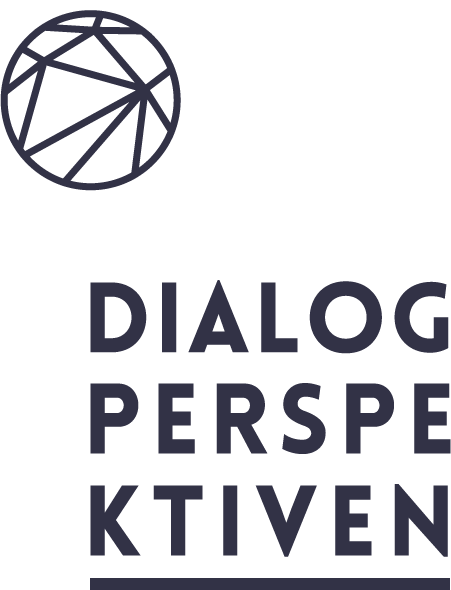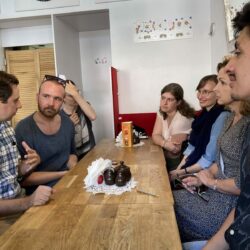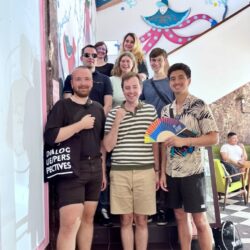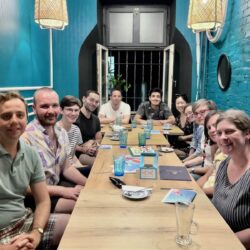Rückblick: Studienreise nach Warschau
"Shrinking spaces of civil society", 10.-13. August 2023
Eine Gruppe aktueller und ehemaliger Teilnehmer*innen von Dialogperspektiven reiste nach Warschau, Polen, um Einblicke in die aktuellen gesellschaftspolitischen Entwicklungen und Herausforderungen der Zivilgesellschaft im Land zu gewinnen. Die Reise bot ihnen die Möglichkeit, mit einer Vielzahl von Akteur*innen in Kontakt zu treten, die sich kritisch mit der aktuellen Situation in Polen auseinandersetzen. Gleichzeitig wurden die Wahrnehmungen und Erwartungen der Teilnehmer in Frage gestellt, da die Reise sie dazu brachte, die vorherrschenden Erzählungen über Polen zu hinterfragen. Die Konfrontation mit bzw. das Eintauchen in neue Kontexte und die Auseinandersetzung mit Menschen aus verschiedenen Regionen ermöglichten eine aufrichtige, unvoreingenommene und nachhaltige Analyse des „Eigenen“ und des „Anderen“.
Impressionen unserer Teilnehmenden
‘The study trip was a very rewarding educational experience for me. I learned a lot about the Jewish heritage of the city, which has a rich and complex history. During the trip, our group visited the Jewish cemetery, which is one of the largest and oldest in Europe, and where many prominent figures of Polish Jewish culture are buried. We also visited the synagogue, which is the only one that survived the Nazi destruction of Warsaw. Moreover, we gained a deeper understanding of the situation of civil society organisations and non-governmental organisations in Poland, which are under pressure and in danger in the current political environment. We met with representatives of various groups that work on human rights, democracy, social justice, and other issues and had the opportunity to learn about their difficulties, achievements, and hopes for the future. The whole group was amazed by their determination, professionalism, and collaboration in pursuing their missions.’ – Mihaly Szabo
‘Most of all, I appreciated meeting the queer organisation Lambda Warszawa and the Catholic queer activist Uschi Pawlik, as well as exploring queer spaces in Warsaw. In times when queer life is under pressure, it was powerful to see how people are creating safer spaces, fighting for them, and celebrating their queer joy.’– Thomas
‘I believe that the best part of the trip in Warsaw are the friendships that were formed between the participants. There was an instant connection. We discussed many topics, mostly about the work we do in intercultural dialogue all around the word. We all inspired each other to continue what we are doing to make the world a better place.’ – Tania Hannoun
‘‘In Warsaw, the first thing that I saw when I left the train station was its skyline – striking in its heterogeneity, with daunting Socialist or Stalinist architecture right next to hyper-capitalist palaces made out of glass, seemingly light and transparent. At least as impressive to me were the people I got the chance to meet outside of our “official schedule” in a variety of thriving queer spaces: the ballroom performer from Tunisia who more or less randomly got stuck in Warsaw, the refugee from Afghanistan who often travels to Hamburg to visit her family, the queer teenager worried about his friends in the occupied sector of Ukraine, and the economist who returned to Warsaw after having lived in Berlin for a long time because he felt safer and more appreciated here. This study trip left me with so many surprises and unexpected encounters – it successfully challenged whatever preconceived notion I had of Warsaw!’ – Simon Stromer
Warsaw in one picture
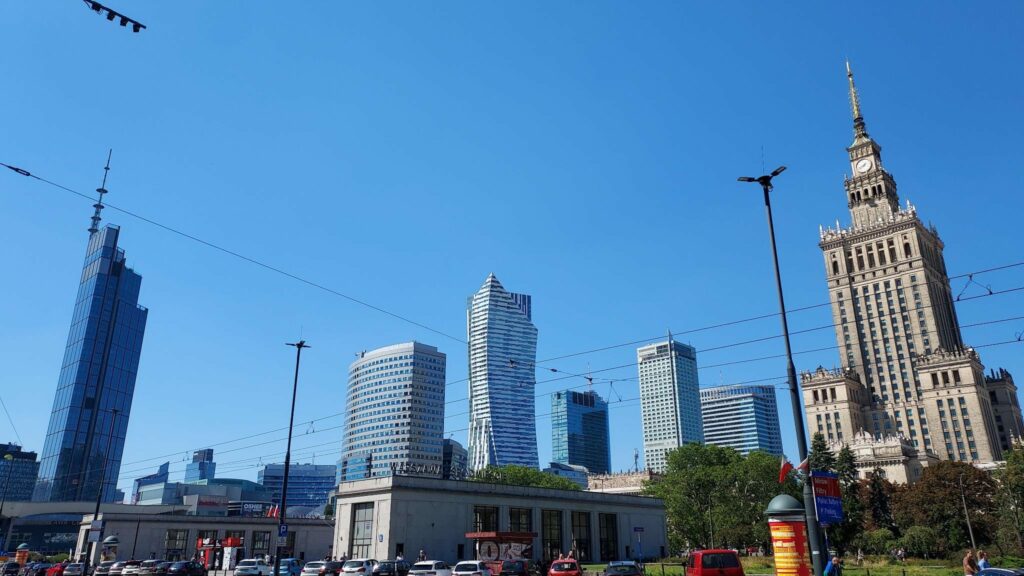
‘This picture represents my impression of Warsaw: an eclectic mix of old and new, and the re-invention, constant change, and adaptation that result from a mixture of things that seem to be at odds with each other at first sight. Rather than, in a way, covering up its past by demolishing or otherwise abandoning buildings characteristic of the socialist era such as the Palace of Culture, inaugurated in 1955, it is being put to use by the people of the city who, for example, enjoy the basketball courts in front of it. Opposite the street, there is a dense structure of skyscrapers, many of which host multinational tech companies. At the same time, the devastating impact of the Second World War on the city is felt throughout, and the Jewish population has diminished. Yet, in the present, civil society is active in shaping and maintaining its space in the country, including by supporting refugees to alleviate the little-known humanitarian crisis at the Polish and thus EU-Belarussian border.’- Dr. Leonie Schoelen
Historic and current narratives on ‘the other’
‘To introduce my reflection on the study tour, I chose the video above: a graffiti of the poem “The Locomotive” by Julian Tuwim and a kosher shop close to the Nożyk Synagogue. Compared with the gentrified district of Kazimierz in Kraków, the material remnants of pre-war Jewish life in Warsaw have been reduced to narrow urban spaces away from the touristy parts of the city centre and are overshadowed by the imposing glass skyline of Warsaw as a corporate hub.
At the beginning, our guide for the “Warsaw Judaica” tour, Jakub, clarified the terms of his tour. On the one hand, he highlighted “the war” and “the uprising” among other episodes of Polish history. On the other, he described the controversial distinction between “the Poles” and “the Jews”. Similar differentiations, as well as the reduction and marginalization of spaces for minorities in Polish society, appeared during other moments of our trip: both in the memory of the past, like the uncommented video clip of a person of colour contributing to the reconstruction of Warsaw in the late 1940s, as well as in the present, as one of our guest speakers mentioned that migrants from Central and South Asia “are never outside on the streets” in Warsaw today.
Among the participants, we reflected upon the role of those gaps and the dominant perspective on the people who are considered “the others” today. The mainstream narrative of Polish society, even in activism for marginalized people, often misses chances to extend a hand to the people perceived as “the others”. Therefore, “the others” fall into indifference, even into oblivion. However, the solution to that conundrum could easily be achieved by extending a hand and empathizing with the “othered” perspective. I was left with the impression that the public discourse in Poland is moving in the opposite direction, at least during the election campaign. History is highly politicized and almost everyone on the mainstream political spectrum assumes that they need to win the favour of the far-right populist party. This trip offered me the chance to perceive the contrasts and ruptures with the past and present of a society that is often assumed as monolithic, even if it doesn’t seem that way after you look beyond the shiny skyline and the tourist influx.’ – Felipe
‘Reflecting on a weekend of discovery in Warsaw, which introduced our group to many aspects of civil society in Poland today, a particular pattern emerged. On a fascinating tour of Warsaw’s Jewish history, which offered a window into a period during which the city was anything but homogeneous, our guide observed, “In Poland when we speak about the war, we mean one war, the Second World War.” Indeed, that conflict was decisive in the tragic fate of the city’s Jews.
Later when considering the national context with Prof. Agnieszka Nogal and its influences on her field of political philosophy, she drew our attention to the well-honed capacity of Polish culture to operate through informal networks, suggesting this quality had its roots in the experience of domination by Prussians, Russians and even the Habsburg Empire. A different historical locus for understanding contemporary identity in Poland emerged.
The next day at Lambda Warsaw we had the remarkable opportunity to stand in a small room and explore records of gay identity in Poland, which stretched far earlier than the 1980s to which Miłosz Przepiórkowski traced the origin of gay activism in the country. Those pivotal years proved an inflection point, which nevertheless belied the larger reservoir of resources on which they drew.
“The war” may have made Poland more homogenous, but today war is also changing its make-up, as conversations about migrants’ rights at the Helsinki Foundation for Human Rights attested, and which we witnessed on the streets and in shops where support for and the presence of Ukrainians was abundantly visible.
While the pall of political capture and corruption seemed a source of near-universal concern, rather than fearing the future, I find myself recalling the way in which different narratives found their roots in powerful historical experiences. Forces which celebrate homogeneity may make appeals to the past, but they can only possess it through their audiences’ and our own amnesia. Visiting Poland was a valuable reminder of the many ways Poland’s history offers points of hope for civil society to flourish in the years to come.’ – Stephan McCarthy
Text & Fotos: Sonya Ouertani & Simon Stromer
